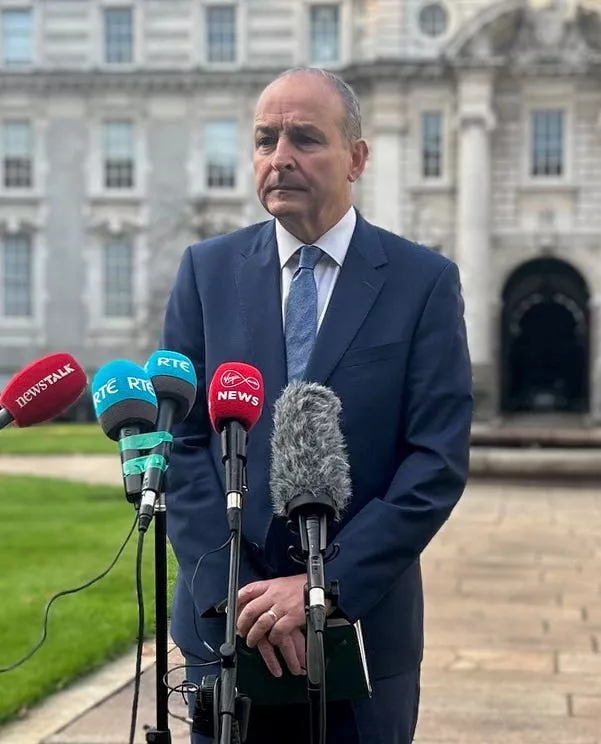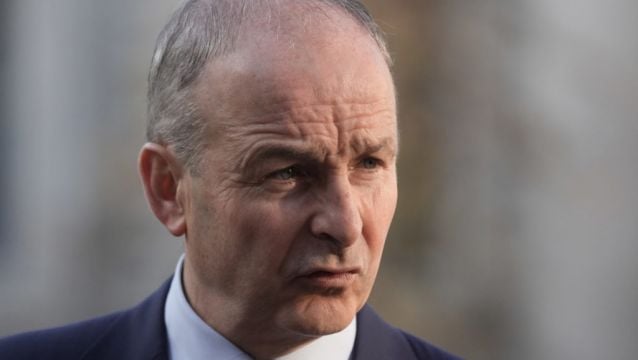The Tánaiste has condemned Iran’s missile attack on Israel as “reckless”, as senior figures in government called for efforts to be made to avoid “a catastrophic second front of war” in the Middle East.
Tánaiste and Foreign Affairs Minister Micheál Martin expressed sympathy with the Israeli people “in the face of this aggression” by Iran.
He said officials are in contact with the Irish embassy in Tel Aviv and its representatives in Ramallah and encouraged Irish citizens to follow the advice of authorities.
Earlier on Tuesday, the Israeli military launched what it described as a “limited, localised” operation against Hezbollah targets in southern Lebanon, carrying out “targeted ground raids” in villages close to the Israeli border.
Mr Martin said he was “very concerned” by Israeli troops starting “ground raids” in villages in south Lebanon, saying international humanitarian law is not being respected.
He said there would be an “extraordinary” impact on people by a ground incursion and that potentially leaving more than a million people displaced is “unacceptable”.
“This continuing escalation needs to stop,” Mr Martin said.
“The consequences of widening regional conflict would be disastrous for all the peoples of the region.
“I urge all leaders to think of the immediate and long-term consequences of their actions.
“We need to see immediate ceasefires in Gaza and in Lebanon, the release of hostages and a return to diplomatic and political pathways to bring this cycle of violence to an end.”

Taoiseach Simon Harris said that Irish citizens have been advised to leave or make arrangements to leave while it is still possible.
It is believed that up to 150 Irish citizens are in Lebanon, with many opting to leave following the escalation in fighting.
Speaking on Tuesday morning, Mr Harris said: “The Government advice to Irish citizens in Lebanon has been consistent now for quite a significant period of time, in asking those people to leave and asking to register with our embassy and consulate structures and to make arrangements to leave.
“That has been our advice for a significant period of time, and remains, of course, our advice today.”

In a statement, Ireland’s Defence Forces said that while the situation is “tense”, all Irish peacekeepers were safe and are “maintaining force protection measures”.
Mr Martin said the incursion is in “a different area (to) where our troops are located”.
Defence Forces Chief of Staff Lieutenant General Sean Clancy said on Tuesday: “Following the events in southern Lebanon last night and this morning, I want to reassure the families of our personnel deployed in the region that the safety of our troops is our utmost priority, and we appreciate the support from their families during this time.
“We are in constant contact with them and are actively monitoring the situation on the ground.
“While the current circumstances are challenging, our personnel remain committed to their peacekeeping mission and are well-trained to handle any increased volatility.”
Mr Harris paid tribute to Irish troops in Lebanon, saying their safety “remains absolutely paramount”.
“I specifically met the secretary-general of the United Nations António Guterres last week on this and got an operational update from him as things were then,” he said.
“I’m absolutely satisfied from my conversation with him that the UN and all of our partners involved in the Unifil mission, including Ireland, are monitoring this situation on a very regular basis.”
He said the government is “at every opportunity” consistently calling for a de-escalation in the Middle East.
“The last thing the Middle East needs right now is the opening of a catastrophic second front of war,” Mr Harris added.
“Sadly, that seems to be what’s happening. Even at this late hour, I’d echo calls from so many other counterparts across the globe for a de-escalation in this very challenging situation.
“It’s the international community who have to pick up the pieces in the aftermath of such wars.
“And Hezbollah has been a very malign influence in Lebanon and have done some terrible things.
“Our view, the escalation has been disproportionate and has been excessive, and the real challenge lies in how does one build reconciliation in a very poisonous atmosphere, where many, many Arab populations are incensed, where visceral feelings are growing as a result of all of this war and conflict, which will leave a very poisonous legacy for the next number of decades and will take a lot of peace-making and reconciliation to turn around the impact and the consequences of these wars and the scale of it.
“The destruction of it is incredible, 2,000-pound bombs being rained down, it seems that no-one is thinking too much of the innocent women, men and children who happen to get killed or caught up in these wars.
“There is an obligation on all actors, on Hezbollah, to stop firing rockets and on Hamas likewise.”
Trócaire is gravely concerned by the unprecedented escalation of Israeli airstrikes across Lebanon and the latest incursion into southern Lebanon. pic.twitter.com/5AR3T2f7OL
— Trócaire (@trocaire) October 1, 2024
Trocaire’s chief executive Caoimhe de Barra said: “The ground invasion by Israel into Lebanon amidst ongoing bombing means that more people will be displaced, adding to the one million people who have already left their homes in Lebanon in the last two weeks seeking safety.
“The Irish Emergency Alliance is on the ground with our partners providing access to food, shelter and medical assistance.
“We are asking the Irish public to support our work so we can help people in Lebanon and in Gaza who are living with the nightmare of war.”







